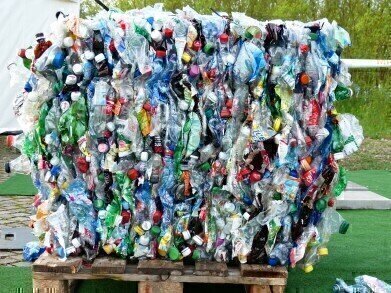Environmental Laboratory
How Many Times Can Plastic Be Recycled?
May 25 2018
You would be forgiven for thinking that every time you throw a plastic bottle into the recycling, it will eventually be reincarnated as another plastic bottle. Unfortunately, that’s not quite how it works; the majority of plastics can only be recycled one time – and not into a bottle. Instead, they are more likely to end up as part of the material that constitutes a shoe, jumper or park bench.
However, a team of researchers from Colorado State University believe they have come up with a new form of plastic which retains all of its advantages (convenience, durability, heat resistance, cheapness) with none of the environmental cost. Pioneered by Professor Eugene Chen, the new polymer can be converted back into its original state without the use of complicated lab techniques or toxic chemicals, meaning it could potentially be recycled an infinite number of times.
The real cost of plastic
Most plastics can only be recycled once, at which point they are normally converted into clothing or some other commodity which can’t be recycled again. This means that once the second item reaches the end of its lifespan, so too does the original plastic – and it ends up in a landfill. Due to its long-lasting properties, it doesn’t break down in the atmosphere and remains there for many, many years.
While much of this plastic is sent to landfill, a significant percentage of it finds its way into our oceans and seas; in fact, some estimates state that we dump around 12 million tons of the stuff into our waterways every year. This poses a significant problem for marine life, which already has to cope with a myriad number of manmade threats, such as blue green algae, overfishing of waters, coral bleaching and other effects of climate change.
A new approach
Building upon a study they completed in 2015, Professor Chen and his team have developed a method of converting monomers into polymers without the use of solvents, only a small amount of catalyst and through a procedure conducted at room temperature for just a few minutes. The resultant polymer is very similar to plastic in that it can withstand high temperatures, is lightweight and flexible.
Crucially, however, the polymer is capable of being converted back into its original monomer form using a catalyst in undemanding lab conditions. It does not require any more treatment after this point, meaning it has the potential for an infinite lifespan. While science is making great strides in the battle against plastic pollution, discoveries like Professor Chen’s could be the real gamechanger in all of this.
The idea is still very much in its infancy, but the team are now scaling up production to see how commercially viable it is. “It would be our dream to see this chemically recyclable polymer technology materialise in the marketplace,” said Professor Chen.
Digital Edition
IET 34.2 March 2024
April 2024
Gas Detection - Biogas batch fermentation system for laboratory use with automatic gas analysis in real time Water/Wastewater - Upcycling sensors for sustainable nature management - Prist...
View all digital editions
Events
Apr 22 2024 Hannover, Germany
Apr 22 2024 Marrakech, Morroco
Apr 23 2024 Kuala Lumpur, Malaysia
Apr 23 2024 Kintex, South Korea
Apr 23 2024 Edmonton, AB, Canada


















